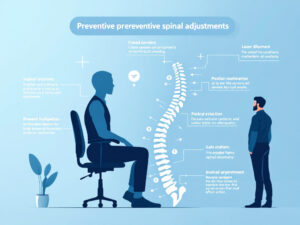Understanding postpartum needs
After childbirth, your body undergoes dramatic changes that can leave you feeling stiff, sore, and out of balance. Natural postpartum recovery chiropractic focuses on gentle realignment of your spine and pelvis to help you regain comfort and function. By addressing musculoskeletal shifts, this specialized care can support your overall postpartum wellness.
In Charlotte, numerous women find relief and renewed vitality through chiropractic care for new moms charlotte. Whether you’re experiencing low back pain, pelvic instability, or lingering tension, a tailored chiropractic approach can help you navigate the fourth trimester with confidence.
Exploring chiropractic benefits
Chiropractic care offers more than temporary pain relief. For postpartum mothers, realigning your spine and pelvis promotes holistic healing and long-term wellness.
Pain relief and posture improvement
Pregnancy and infant care often strain your lower back, neck, and shoulders. Gentle chiropractic adjustments ease joint pressure, reducing discomfort and allowing you to care for your baby more comfortably. According to Focus Chiropractic, postpartum chiropractic care helps new mothers recover by realigning the spine and pelvis, improving posture, and relieving muscle tension through gentle adjustments tailored to the postpartum body [1].
Benefits include:
- Reduced lower back and hip pain
- Alleviated neck and shoulder tension
- Improved ease of movement during daily tasks
Pelvic alignment and core stability
Hormonal changes, particularly elevated relaxin levels, can leave your pelvic joints lax and unstable for months after delivery. Chiropractic adjustments support sacroiliac joint realignment, helping you regain pelvic stability and core strength. This alignment assists in managing conditions like diastasis recti by promoting proper muscle engagement and reducing strain on your abdominal wall.
Supporting breastfeeding mothers
Proper spinal and neck alignment isn’t just about posture—it impacts your nervous system and, in turn, your milk production. Gentle adjustments can optimize nerve function, reduce mastitis risk, and ease nursing-related neck and shoulder pain. One case report noted that spinal realignment improved a new mother’s baby latch, enhancing feeding comfort for both mother and infant [1].
Addressing common postpartum issues
Chiropractic care targets a range of postpartum challenges, from musculoskeletal pain to nerve compression.
Pelvic misalignment and diastasis recti
- Pelvic misalignment often leads to uneven gait, hip pain, and strain on your pelvic floor muscles.
- Diastasis recti, the separation of abdominal muscles, can cause core instability.
Through gentle sacroiliac adjustments, soft tissue therapy, and rehabilitative exercises, you can restore balance and support your core’s natural healing process.
Neck, shoulder, and back tension
Constant nursing and infant holding can leave you with persistent tension in your upper body. Chiropractic care relieves nerve pressure and improves circulation without relying on medication. Regular sessions paired with posture education help you avoid chronic strain.
Sciatica and nerve impingement
Sciatic nerve pain may arise from pregnancy-related disc pressure or pelvic shifts. Targeted lumbar adjustments can ease nerve compression, reducing radiating pain in your legs and hips. An observational cohort study found that 3.8% of pregnant patients experienced transient pain following lumbar spinal manipulation, resolving within a week, suggesting lumbar SMT may be relatively safe during and after pregnancy [2].
Preparing for your visits
Understanding what to expect can make your chiropractic experience more comfortable and effective.
What to expect during sessions
- Initial assessment of your spine, pelvis, and overall posture
- Gentle, hands-on adjustments tailored to your comfort level
- Soft tissue therapy and mobilization techniques
- Guidance on posture, lifting, and infant handling
Your chiropractor may use instruments like an activator for low-force adjustments, especially if you’re still experiencing hormonal ligament laxity.
Post-visit exercises and education
To maximize benefits, your practitioner will recommend simple strengthening and stretching exercises. These may include:
- Gentle pelvic tilts to engage core muscles
- Neck mobility drills to ease tension
- Posture correction tips for feeding and lifting
Ensuring safe treatment
Safety is paramount during the vulnerable postpartum period. Open communication and informed consent ensure you receive the right care.
Timing and consultation guidelines
- Vaginal delivery: sessions can begin within days to a week post-birth, pending comfort
- Cesarean delivery: wait 6–8 weeks or until your healthcare provider clears you for manual therapy
- Always discuss any complications, such as diastasis recti severity or pelvic symphysis diastasis, with your chiropractor
Understanding risks and precautions
While adverse events are rare, a literature review reported cases ranging from minor transient pain to severe complications like fracture or epidural hematoma, mainly after cervical manipulation [2]. To minimize risk:
- Ensure your chiropractor performs a thorough history and examination
- Avoid high-velocity cervical adjustments if you have increased hypercoagulability or vascular concerns
- Opt for low-force techniques when ligament laxity is pronounced
Choosing your Charlotte chiropractor
Selecting the right practitioner is essential for a positive, safe recovery experience.
Specialized credentials and techniques
Look for a chiropractor with certifications in women’s and pediatric care:
- Webster certified practitioners for pregnancy and postpartum alignment [3]
- Experience with Activator instrument or instrument-assisted adjustments
- Training in soft tissue therapy and rehabilitative exercise prescription
Clinic experience and environment
The best clinics foster a nurturing, supportive atmosphere. Consider facilities that specialize in women’s chiropractic wellness, such as prenatal and postpartum chiropractic clinic charlotte) or female-focused chiropractic care charlotte).
Key questions to ask:
- Do they offer private or semi-private treatment rooms?
- How does the team support your mental and emotional well-being?
- Are there additional services like nutrition counseling or pelvic floor therapy?
Planning long-term wellness
Chiropractic care can be a cornerstone of your ongoing health journey beyond the postpartum period.
Ongoing care and self-care tips
- Schedule maintenance visits to keep your spine and pelvis balanced
- Continue your home exercise program for core strength and flexibility
- Practice mindful posture during all activities, from working at a desk to caring for your child
Integrating chiropractic into lifestyle
Embrace holistic habits that complement your adjustments:
- Prenatal yoga and gentle stretching to maintain flexibility
- Ergonomic pillows and nursing supports to reduce strain
- Mind-body practices like meditation to regulate stress and foster healing
By choosing natural postpartum recovery chiropractic in Charlotte, you’re investing in a drug-free, non-invasive path to lasting comfort and vitality. With thoughtful alignment, educational guidance, and a supportive environment, you can move confidently into motherhood and beyond.




